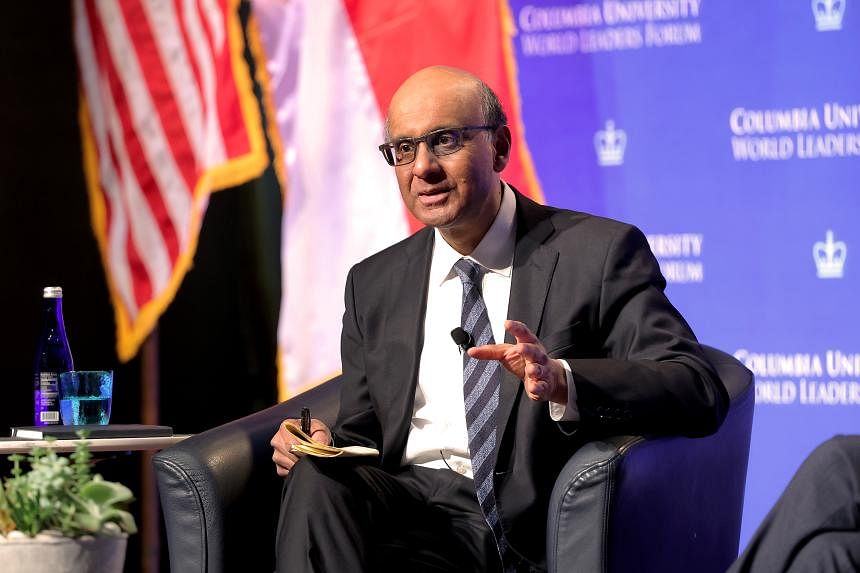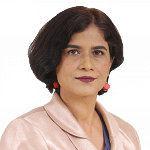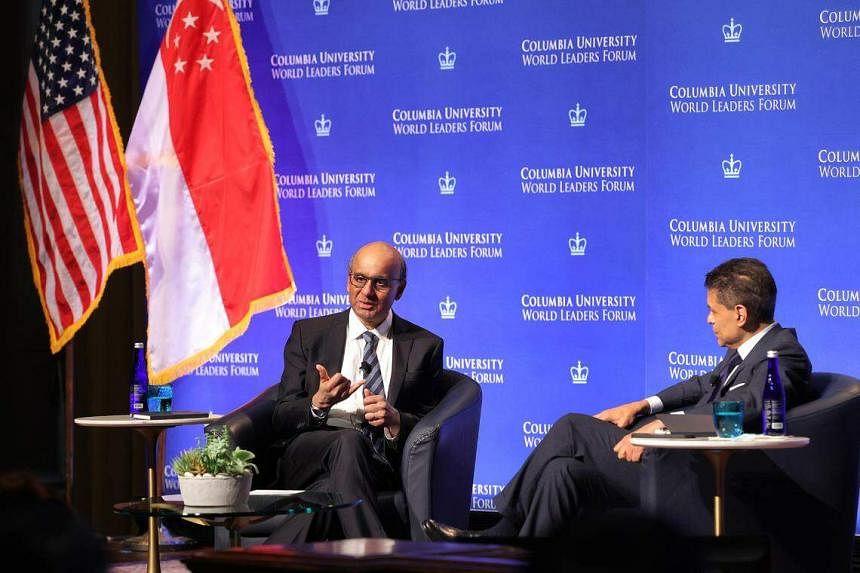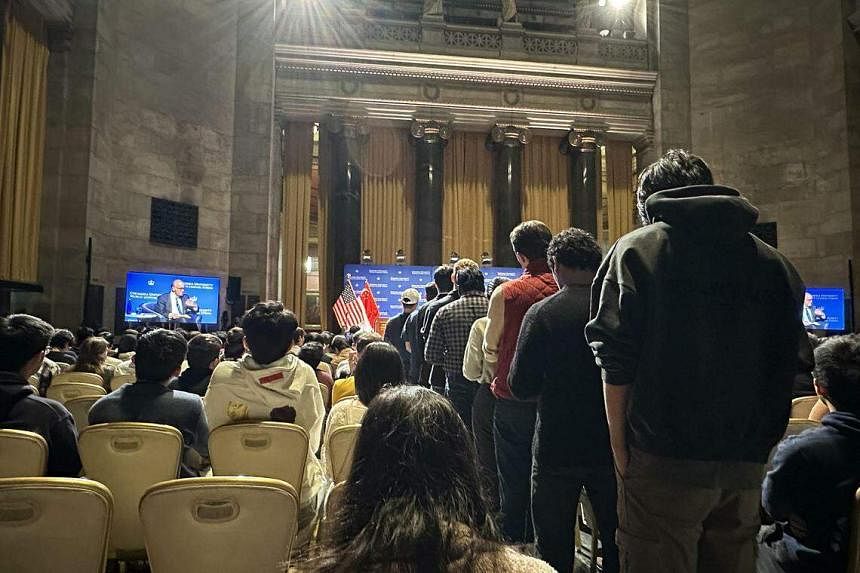風蕭蕭_Frank
以文會友找到民主彌合分歧而不是擴大分歧的方法必須符合我們自己的利益,”他補充道。
“我們在這樣做時必須記住,我們所處的世界很容易在我們自己的社會和國際範圍內分裂。”
It must be in our own interests to find ways in which democracy bridges differences, rather than widens them,” he added.
“And we have to do this remembering that we are in a world where we can be very easily pulled apart, within our own societies and internationally.”
尚達曼總統呼籲保持韌性和樂觀,以支撐正在分崩離析的世界
https://www.straitstimes.com/world/united-states/president-tharman-calls-for-resilience-and-optimism-to-shore-up-an-unravelling-world
尚達曼校長在哥倫比亞大學世界領導人論壇上發表講話時表示,多邊主義和民主國家的運作方式必須重新定位。 照片:MCI
Bhagyashree Garekar 美國分社社長 2023 年 11 月 30 日
紐約 — — 11 月 28 日,尚達曼總統在紐約哥倫比亞大學世界領導人論壇上發表加布裏埃爾·西爾弗紀念演講時表示,在這個正在分崩離析的世界中,核心任務是培養韌性和樂觀精神。
尚達曼在上任以來的首次重大國際活動中表示,要做到這一點,必須重新調整多邊主義和民主運作的方式。
“沒有完美的解決方案,但我們仍然可以采取大膽的行動,”在紐約一個寒冷的夜晚,他對聚集在高圓頂低圖書館圓形大廳裏的近 300 名大學生和教職人員說道。
他是在對美國進行工作訪問的第二天發表上述言論的。
本次活動由國際與公共事務學院全球政治研究所共同主辦。
該講座成立於 1949 年,旨在增進國際理解。 1968 年,時任新加坡總理李光耀在同一論壇上發表了講話。其他著名演講者包括西德首任總理康拉德·阿登納先生和美國前財政部長拉裏·薩默斯。
尚達曼在談到歐洲戰爭、中東血腥衝突以及中美緊張局勢時表示,“我們所熟悉的世界正在逐漸瓦解,而且不知道這會在哪裏結束。” 建立數十年來支撐世界安全與繁榮的國際秩序。
“但這不僅僅是壞事件和壞演員的問題,”他說。
“我們必須看得更深入; 看看我們所處的世界中強大的不穩定暗流——地緣政治、生態,甚至我們社會內部的國內暗流。”
他說,這些力量可能是緩慢移動的,但它們相互結合,可以推動世界越過臨界點,進入不可預測和不可逆轉的領域。
“如果我們繼續忽視這些暗流,我們隻是在等待下一次危機的到來。 我們將在應對一場又一場的危機時,付出巨大的代價,以人類生命、生計以及民主國家和全球秩序的信譽為代價。”
尚達曼表示,其中之一是基於規則的秩序的衰落,這在很多方麵都很明顯,他指出,衝突更加頻繁、持續時間更長,對主權的威脅也更大,尤其是對小國而言。 更重要的是,高度一體化的全球經濟的分裂將付出巨大的代價,他警告說。
他說,隨著世界向真正的多極化轉型,美中關係成為一個關鍵的複雜因素。
他補充說:“這是緊張局勢的中心軸,將決定我們是螺旋式下滑還是穩定下來。”他形容美國總統喬·拜登和中國國家主席習近平 11 月 15 日的會晤暗示著局勢惡化的軌跡“暫停”。 關係。
“我們知道我們不再處於單極世界,但我們還沒有處於真正的多極世界。 我們當然還沒有進入一個穩定的多極化世界。 可能需要一些時間才能到達那裏。 但與此同時,美中關係確實需要穩定,”他說。
對於氣候變化導致的地球生存危機,尚達曼提出了更為樂觀的看法,他表示,“獲得更美好的未來就意味著今天要付出巨大的代價”這一觀點已經成為一種謬論。
“那是舊的想法。 但我們現在知道,如果我們投資新技術和新增長模式,就不存在真正的權衡。”他指出,在全球經濟脫碳的同時保持增長是可能的。
他說,第三個因素——國內暗流——正在侵蝕對民主的信任。
他說:“我們在全球範圍內的核心問題實際上在於國內社會和政治動態。”他指出,太多社會在種族和移民融合方麵沒有取得成功。
“我們看到不同教育水平的人、不同職業或各行各業的人、或者居住在國家不同地區——城市、郊區、農村地區的人之間越來越不熟悉。 人與人之間的距離越來越遠,彼此之間的信任以及對包括政府在內的民主機構的信任逐漸喪失。”
在這種疏離的情況下,多元文化國家試圖創造一種共同的文化是雙方交流的主題。
尚達曼先生與 CNN 主持人、《華盛頓郵報》專欄作家法裏德·紮卡裏亞 (Fareed Zakaria) 在演講後進行對話。
紮卡裏亞表示,美國已經成功圍繞人們團結起來的一套共同政治理想創造了一種共同文化。 這樣,它就不同於歐洲國家以及新加坡,不同的社區生活在自己的傳統中,同時也在共同的公民空間中聚會。 紮卡裏亞先生詢問新加坡異族通婚率的上升是否意味著這種模式需要更新。
尚達曼總統與《華盛頓郵報》專欄作家法裏德·紮卡裏亞交流的主題是,在這種疏離的情況下,多元文化國家試圖創造一種共同文化。
2022 年,新加坡公民約有六分之一的婚姻是跨種族婚姻,與前一年的趨勢一致。 大約三分之一的公民婚姻涉及跨國夫婦,這一比例較 2021 年的 29% 有所增加。
尚達曼將新加坡的經驗與歐洲和美國的經驗進行了對比,稱新加坡選擇不聽天由命。
“新加坡從未追求多元種族主義的熔爐概念。 但我們也沒有追求不同地區的多樣性,我們生活的地方也讓人們生活——生活在自己的社區,就像巴黎郊區的人一樣,你在不同的學校長大,你有自己的做法,但是 你們唱同一首國歌。 我們也沒有這麽做。
“我們實際上采用了一種非常侵入性的融合模式,”他指出新加坡的學校係統、住房政策、辦公室和市場,這些都是為了鼓勵社區之間的日常互動而設計的。
他說,歐洲的被子模型最初看起來充滿活力且有吸引力。 “但是當你開始受到來自社會外部或內部的拉力時,每個補丁之間的接縫就會磨損,”他說。
他補充說,盡管美國看似一體化,但它並沒有成功消除住房、社區和學校方麵的種族隔離。
“我們無法真正互相教導對方什麽是必要的,因為我們來自不同的曆史,”他說。
“新加坡由於建國的不同尋常的開端,采取了一種非常侵入性的方法,將這些線編織成一個共同的織物,但認識到它們是不同的線。 人們確實希望保留自己的認同感、信仰、文化感。 它給你的生活帶來了一些意義,但你也是新加坡社會共同結構的一部分。
“我越來越感覺到,隨著我們作為一個國家的前進,我們必須確保人們不僅僅將自己視為不同種族和宗教的人,不僅將自己視為擁有新加坡國籍,而且 以及分享彼此的文化。
“對彼此的文化感興趣,說一點語言。 你們不需要會寫,甚至可能不會讀,但會說彼此的一些語言。 最重要的是,一起成長,互相交朋友。 你們可能會結婚,也可能不結婚。 但你們是朋友。
“新加坡可以做到這一點。 但如果我們從一開始就沒有這種融合模式——在學校、住房和工作中,這是不可能的。”
尚達曼在演講中還闡述了社會需要采取哪些措施來對抗破壞性力量。 他說:“我們的中心任務必須是在這個充滿不確定性的時刻建立韌性和樂觀態度,並解決和遏製這些暗流。”
“我們必須找到多邊主義在不完美的世界中發揮作用的方法。
“我們必須建立願意解決全球公域最緊迫挑戰的聯盟,並維護全球競爭中的遊戲規則。 並保持聯盟向新成員開放。”
“多邊主義仍然存在”:李總理敦促二十國集團國家繼續推進世貿組織和開發銀行的改革
維維安:隨著世界進入新時代,多邊主義、經濟一體化、全球公域變得更加重要
他說,民主國家的政治領導人可能過於專注於贏得下一次選舉,因此也必須重新定位,並指出政治需要“減少短期性和狹隘性……以便民主在政治中減少分裂。” 實踐”。
他說,應對迫在眉睫的挑戰,即使是遙遠的挑戰,也符合每個國家的自身利益。
“每個社會肯定有可能認識到投資全球公域符合其自身利益,因為我們都會受到其侵蝕的影響。 我們必須認識到,今天進行長期投資符合每個社會的利益,而不是在未來幾十年裏增加更大的負擔,”他說。
“我找到民主彌合分歧而不是擴大分歧的方法必須符合我們自己的利益,”他補充道。
“我們在這樣做時必須記住,我們所處的世界很容易在我們自己的社會和國際範圍內分裂。”
在劉氏紀念圖書館與尚達曼總統進行長達一小時的互動期間,學生們排隊提問。
超過兩打的學生在過道裏排著隊,就各種問題提出問題,從新加坡的人工智能戰略到人口老齡化問題,再到扭轉去全球化的趨勢。
“我想問他是否有辦法阻止烏克蘭戰爭,”同樣排隊等候麥克風的本科生瑪麗安娜女士說道。
“但我沒有機會。 遊戲中存在太多問題。”
President Tharman calls for resilience and optimism to shore up an unravelling world

In his speech at Columbia University's World Leaders Forum, President Tharman Shanmugaratnam said the ways in which multilateralism and democracies function will have to be reoriented. PHOTO: MCI
 Bhagyashree Garekar US Bureau Chief NOV 30, 2023
Bhagyashree Garekar US Bureau Chief NOV 30, 2023NEW YORK – The central task in an unravelling world is to build resilience and optimism, President Tharman Shanmugaratnam said while delivering the Gabriel Silver Memorial Lecture at Columbia University’s World Leaders Forum in New York on Nov 28.
To do this, the ways in which multilateralism and democracies function will have to be reoriented, Mr Tharman said during his first major international event since taking office.
“There are no perfect solutions, but there are bold actions which are still within our reach,” he told the audience of nearly 300 university students and faculty who packed the high-domed Low Library rotunda on a chilly evening in New York.
He was speaking on the second day of his ongoing working visit to the United States.
The event was co-sponsored by the Institute of Global Politics at the School of International and Public Affairs.
The lecture was established in 1949 to foster greater international understanding. Singapore’s then Prime Minister Lee Kuan Yew spoke at the same forum in 1968. Other eminent speakers have included West Germany’s first chancellor, Mr Konrad Adenauer, and former US treasury secretary Larry Summers.
“The world we knew is gradually unravelling, and there’s no telling where this will end,” Mr Tharman said, in a reference to the war in Europe, the bloody conflict in the Middle East and US-China tensions, all of which have shaken up the international order that has underpinned the world’s security and prosperity for decades.
“But it’s not just about bad events and bad actors,” he said.
“We have to look deeper; look at the powerful destabilising undercurrents in the world we are in – geopolitical, ecological, and even the domestic undercurrents within our societies.”
These may be slow-moving forces, but they compound each other and can push the world past the tipping point into unpredictable and irreversible realms, he said.
“If we keep ignoring those undercurrents, we’re just waiting for the next crisis to come. We will be responding to one crisis after another at great cost to human life, to livelihoods and to the credibility of both democracies and the global order.”
One of these is the ebbing of the rules-based order, which is evident in many ways, Mr Tharman said, pointing to more frequent and longer conflicts and to the greater threat to sovereignty, particularly for smaller nations. What is more, fragmentation of the highly integrated global economy will come at great cost, he warned.
A key complication is the US-China relationship as the world transitions to become truly multipolar, he said.
“That’s the central axis of tension that will determine whether we spiral down or stabilise,” he added, describing the Nov 15 meeting between US President Joe Biden and his Chinese counterpart Xi Jinping as hinting at a “pause” in the trajectory of a worsening relationship.
“We know we’re not in a unipolar world anymore, but we are not yet in a truly multipolar world. And we are certainly not yet in a world of stable multipolarity. It may take some time to get there. But in the meantime, the US-China relationship does require stability,” he said.
On the planet’s existential crisis as a result of climate change, Mr Tharman struck a more hopeful note, saying it has become a fallacy that obtaining a better future means paying a great cost today.
“That was the old thinking. But we now know that there is no real trade-off if we invest in new technologies and invest in new models of growth,” he said, noting that it is possible to keep growing while decarbonising the global economy.
The third factor – domestic undercurrents – is eroding trust in democracy, he said.
“Our core problems globally are really in domestic social and political dynamics,” he said, noting that too many societies have not succeeded in ethnic and immigrant integration.
“We are seeing a growing unfamiliarity between people with different educational levels, people in different professions or walks of life, or who live in different parts of the country – the cities, suburbs, rural areas. A growing distance between people and a gradual loss of trust among each other and trust in the institutions of democracy, including government.”
The attempt by multicultural nations, in this scenario of alienation, to create a common culture was the topic of an exchange between Mr Tharman and CNN host and Washington Post columnist Fareed Zakaria in a dialogue following the speech.
Mr Zakaria said the US had managed to create a common culture around a shared set of political ideals that people united around. In this way, it is unlike countries in Europe, as well as Singapore, where different communities live within their own traditions while also meeting in common civic spaces. Mr Zakaria asked if the rising rates of interracial marriages in Singapore mean that this model needs an update.

The attempt by multicultural nations, in this scenario of alienation, to create a common culture was the topic of an exchange between President Tharman Shanmugaratnam and Washington Post columnist Fareed Zakaria.
About one in six marriages involving citizens in Singapore was interethnic in 2022, in line with the trend in the previous year. About a third of citizen marriages involved transnational couples, an increase from 29 per cent in 2021.
Mr Tharman contrasted the Singapore experience with that of Europe and the US, saying that the Republic chose not to leave matters up to chance.
“Singapore never went for a melting pot concept of multiracialism. But neither did we go for the quilt of diversity in different patches, where we live and let live – live in your own neighbourhoods like they do in the banlieues in Paris, you grow up in different schools, and you have your own practices, but you sing the same national anthem. We didn’t go for that either.
“We actually went for a very intrusive model of integration,” he said, pointing to Singapore’s school systems, housing policies, offices and markets, which are designed to encourage daily interaction between communities.
Europe's quilt model looks vibrant and attractive initially, he said. “But the moment you start getting pulls on that fabric, coming from outside your society or from within, the seams between each of the patches fray,” he said.
And while the US appears integrated, it has not managed to do away with segregation in housing, neighbourhoods and schools, he added.
“We can't really lecture each other on what's necessary because we come from different histories,” he said.
“Singapore, by force of an unusual start to nationhood, went for a very intrusive approach of weaving those threads together into a common fabric, but recognising that they were different threads. And people did want to retain their own sense of identity, their faith, a sense of their own culture. It gave you some meaning in life, but you were part of a common fabric of Singapore society.
“And more and more I do feel as we go forward as a country, we’ve got to make sure that people don’t just see themselves as persons of different races and religions, not just see themselves as sharing a Singaporean nationality, but as sharing each other’s cultures as well.
“Taking an interest in each other’s cultures, speaking a bit of language. You don’t need to be able to write, maybe not even read, but speak some of each other’s languages. Most importantly, grow up together, make friends with each other. You might get married or not get married to each other. But you’re friends.
“And Singapore can do that. But it would not have been possible had we not had that model of integration from the start – in schools, housing, at work.“
In his speech, Mr Tharman also laid out what societies needed to do to fight the destructive forces. “Our central task has to be to build resilience and optimism at this time of radical uncertainty, and to address and roll back these undercurrents,” he said.
“We must find ways for multilateralism to work in an imperfect world.
“We have to build coalitions of the willing to address the most urgent challenges of the global commons, and to preserve rules of the game in global competition. And keep the coalitions open to new members.”
Democracies, where political leaders can be too focused only on winning the next election, also have to be reoriented, he said, pointing to the need for politics to be “less short term and less insular... so that democracy is less divisive in practice”.
Squaring up to the looming challenges, even when distant, is in each country’s own interest, he said.
“It must surely be possible for each society to recognise that it is in its own interests to invest in the global commons, because we’re all going to be affected by its erosion. It must be possible to recognise that it’s in each society’s interests to invest in the long term today, rather than pile up an even larger burden in the decades to come,” he said.
“It must be in our own interests to find ways in which democracy bridges differences, rather than widens them,” he added.
“And we have to do this remembering that we are in a world where we can be very easily pulled apart, within our own societies and internationally.”

Students queueing up to ask questions during the hour-long interaction with President Tharman Shanmugaratnam at the Low Memorial Library.
Over two dozen students lined up in the aisles to ask questions on diverse issues ranging from Singapore’s artificial intelligence strategy to the problem of its ageing population to reversing deglobalisation.
“I wanted to ask if he had a solution to stop the Ukraine war,” said Ms Marianna, an undergraduate, who also queued up for the mic.
“But I did not get a chance. There are just too many issues in play.”




